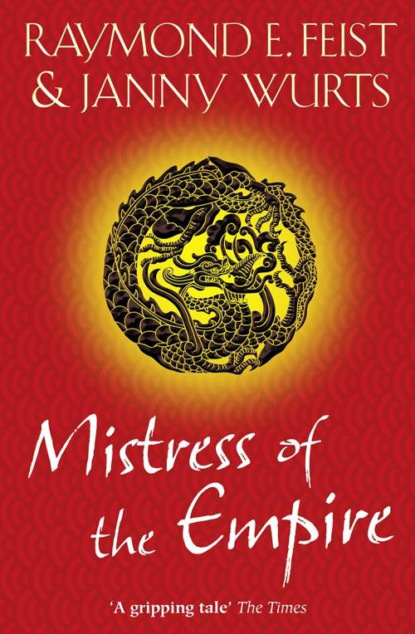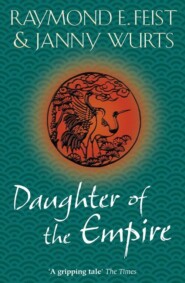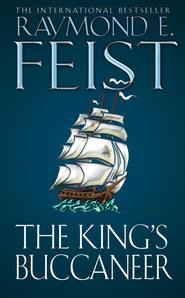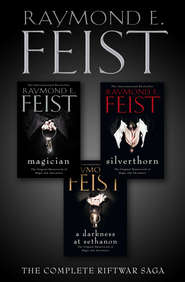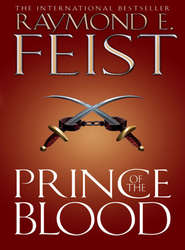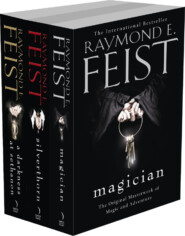По всем вопросам обращайтесь на: info@litportal.ru
(©) 2003-2025.
✖
Mistress of the Empire
Автор
Год написания книги
2018
Настройки чтения
Размер шрифта
Высота строк
Поля
Mara exclaimed in puzzlement from beneath a tangle of cushions and torn curtains, over the noise of Justin’s wails. ‘What –’
To the guards, Hokanu shouted, ‘Behind the akasi bushes!’
The horse stamped, as if at a stinging fly. Ayaki felt his gelding shudder under him. Its ears flattened, and it shook its heavy mane, while he worked the reins to soothe it. ‘Easy, big fellow. Stand easy.’ His stepfather’s warning failed to reach him, so intent was he on steadying his mount.
Hokanu glanced over the litter. The guards now rushed the bushes he had indicated. As he turned to check for possible attack from the other quarter, he saw Ayaki frantically trying to calm a horse grown dangerously over excited. A sparkle of lacquer in the sunlight betrayed a tiny dart protruding from the gelding’s flank. ‘Ayaki! Get off!’
His horse gave a vicious kick. The dart in its hide had done its work, and nerve poison coursed through the beast’s bloodstream. Its eyes rolled, showing wide rings of white. It reared up, towering, and a near-human scream shrilled from its throat.
Hokanu sprang away from the litter. He grabbed for the gelding’s rein, but slashing hooves forced him back. He dodged, tried another grab, and missed as the horse twisted. Familiar enough with horseflesh to know this animal had gone berserk, he screamed to the boy who clung with both hands locked around the beast’s neck.
‘Ayaki! Jump off! Do it now, boy!’
‘No,’ cried the child, not in defiance, but bravely. ‘I can quiet him!’
Hokanu leaped for the reins again, frightened beyond thought for his own safety. The boy’s concern might have been justified if the horse had simply been scared. But Hokanu had once seen the effects of a poison dart; he recognised the horse’s shivering flesh and sudden lack of coordination for what they were: the symptoms of fast-acting venom. Had the dart struck Mara, death would have taken seconds. In an animal ten times her size, the end would be slower, and brutally painful. The horse bellowed its agony, and a spasm shook its great frame. It bared yellow teeth and fought the bit, while Hokanu again missed his grip. ‘Poison, Ayaki!’ he shouted over the noise of the frantic horse. Hokanu lunged to catch the stirrup, hoping to snatch the boy clear. The horse’s forelegs stiffened, bracing outward as the muscles locked into extension. Then its quarters collapsed, and it toppled, the boy caught like a burr underneath.
The thud of the heavy body striking earth mingled with Mara’s scream. Ayaki refused to leap free at the last. Still riding his horse, he was swept sideways, his neck whipped back as the force of the fall threw him across the path. The horse shuddered and rolled over upon the boy.
Ayaki made no sound. Hokanu avoided a hedge of thrashing hooves as he darted around the tormented animal. He reached the boy’s side in a bound, too late. Trapped under the weight of dying, shivering horseflesh, the child looked too pale to be real. His dark eyes turned to Hokanu’s, and his one free hand reached out to grip that of his foster father’s a heartbeat ahead of death.
Hokanu felt the small, dirty fingers go limp inside his own. He clung on in a rage of denial. ‘No!’ he shouted, as if in appeal to the gods. Mara’s cries rang in his ears, and he was aware of the warriors from her honor guard, jostling him as they labored to shift the dead horse. The gelding was rolled aside, the rush of air as its lungs deflated moaning through its vocal cords. For Ayaki, there would be no such protest at shattering, untimely death. The gelding’s withers had crushed his chest, and the ribs stood up from mangled flesh like the broken shards of swords.
The young face with its too white cheeks stared yet, open-eyed and surprised, at the untroubled sky overhead. The fingers that had reached out to a trusted foster father to stave off the horror of the dark lay empty, open, the scabbed remains of a blister on one thumb a last testimony to diligent practice with a wooden sword. This boy would never know the honors or the horrors of a battle, or the sweet kiss of his first maid, or the pride and responsibility of the Lord’s mantle that had been destined one day to be his.
The finality of sudden ending left pain like a bleeding wound. Hokanu knew grief and stunned disbelief. His mind worked through the shock only out of reflex trained on the fields of war. ‘Cover the child with your shield,’ he ordered. ‘His mother must not see him like this.’
But the words left numbed lips too late. Mara had rushed after him, and he felt the flurry of her silken robes against his calf as she flung herself on her knees by her son. She reached out to embrace him, to raise him up from the dusty ground as if through sheer force of love she could restore him to life. But her hands froze in the air over the bloody rags of flesh that had been Ayaki’s body. Her mouth opened without sound. Something crumpled inside her. On instinct, Hokanu caught her back and bundled her against his shoulder.
‘He’s gone to the Red God’s halls,’ he murmured. Mara did not respond. Hokanu felt the rapid beat of her heart under his hands. Only belatedly did he notice the scuffle in the brush beside the trail. Mara’s honor guard had thrown themselves with a vengeance upon the black clothed body of the assassin. Before Hokanu could gather the wits to order restraint – for, alive, the man might be made to say which enemy had hired him – the warriors made an end of the issue.
Their swords rose and fell, bright red. In seconds Ayaki’s killer lay hacked like a needra bullock slaughtered in a butcher’s stall.
Hokanu felt pity for the man. Through the blood, he noted the short black shirt and trousers, the red-dyed hands, as the soldiers turned the body over. The headcloth that hid all but the eyes of the man, was pulled aside to reveal a blue tattoo upon the left cheek. This mark would only be worn by a member of the Hamoi Tong, a brotherhood of assassins.
Hokanu stood slowly. It did not matter that the soldiers had dispatched the killer: the assassin would have died gladly before divulging information. The tong operated to a strict code of secrecy, and it was certain the murderer would not know who had paid his leader for this attack. And the only name that mattered was that of the man who had hired the Hamoi Brotherhood’s services.
In a cold corner of his mind, Hokanu understood that this attempt upon Mara’s life had not come cheaply. This man could not have hoped to survive his mission, and a suicide killing would be worth a fortune in metal.
‘Search the corpse, and track his path through the estates,’ he heard himself saying in a voice hardened by the emotions that seethed inside. ‘See if you can find any clues as to who might have hired the tong.’
The Acoma Strike Leader in command bowed to the master, and issued sharp orders to his men.
‘Leave a guard over the boy’s body,’ Hokanu added. He bent to comfort Mara, unsurprised that she was still speechless, fighting horror and disbelief. Her husband did not fault her for being unable to keep composure and show proper Tsurani impassivity. Ayaki had been all the family she had known for many years; she had no other blood kindred. Her life before his birth had already been jarred by too much loss and death. He cradled her small, shivering body against his own, and added the necessary instructions concerning the boy.
But when the arrangements were complete and Hokanu tenderly tried to draw Mara away, she fought him. ‘No!’ she said in strangled pain. ‘I will not leave him here alone!’
‘My Lady, Ayaki is beyond our help. He already stands in the Red God’s halls. Despite his years, he met death courageously. He will be welcomed.’ He stroked her dark hair, dampened with tears, and tried to calm her. ‘You would do better inside with loved ones around you, and Justin in the care of his nurses.’
‘No,’ Mara repeated, a note in her voice that he instinctively knew not to cross. ‘I won’t leave.’
And though she did after a time consent to have her surviving child sent back to the estate house under protection of a company of warriors, she sat through the heat of the morning on the dusty soil, staring at the stilled face of her firstborn.
Hokanu never left her. The stinks of death did not drive him away, nor the flies that swarmed and buzzed and sucked at the eyes of the seeping corpse of the gelding. Controlled as if on a battlefield, he faced the worst, and coped. In quiet tones he sent a runner slave to fetch servants, and a small silk pavilion to offer shade. Mara never looked aside as the awning was set up above her. As though the people around her did not exist, she sifted torn earth through her fingers, until a dozen of her best warriors arrived in ceremonial armor to bear her fallen son away. No one argued with Hokanu’s suggestion that the boy deserved battlefield honors. Ayaki had died of an enemy’s dart, as surely as if the poison had struck his own flesh. He had refused to abandon his beloved horse, and such courage and responsibility in one so young merited recognition.
Mara watched, her expression rigid as porcelain, as the warriors lifted her son’s body and set it on a bier bedecked with streamers of Acoma green, a single one scarlet, in acknowledgment of the Red God who gathers in all life.
The morning breeze had stilled, and the warriors sweated at their task. Hokanu helped Mara to her feet, willing her not to break. He knew the effort it took to maintain his own composure, and not just for the sake of Ayaki. Inside his heart, he bled also for Mara, whose suffering could scarcely be imagined. He steadied her steps as she moved beside the bier, and the slow cortege wound its way downslope, toward the estate house that only hours earlier had seemed a place blessed by felicity.
It seemed a crime against nature, that the gardens should still be so lush, and the lakeshore so verdant and beautiful, and the boy on the bier be so bloody and broken and still.
The honor bearers drew up before the front doorway used for ceremonial occasions. Shadowed by the immense stone portal stood the household’s most loyal servants. One by one they bowed to the bier, to pay young Ayaki their respects. They were led by Keyoke, First Adviser for War, his hair silvered with age, the crutch that enabled him to walk after battle wounds cost him his leg unobtrusively tucked into a fold of his formal mantle; as he intoned the ritual words of sympathy, he looked upon Mara with the grief a father might show, locked behind dark eyes and an expression like old wood. After him waited Lujan, the Acoma Force Commander, his usual rakish smile vanished and his steady gaze spoiled by his blinking to hold back tears. A warrior to the core, he scarcely managed to maintain his bearing. He had taught the boy on the bier to spar with a sword, and only that morning had praised his developing skills.
He touched Mara’s hand as she passed. ‘Ayaki may have been only twelve years of age, my Lady, but he already was an exemplary warrior.’
The mistress barely nodded in response. Guided by Hokanu, she passed on to the hadonra next in line. Small, and mouse-shy, Jican looked desolate. He had recently succeeded in intriguing the volatile Ayaki with the arts of estate finance. Their games using shell counters to represent the marketable Acoma trade goods would no longer clutter the breakfast nook off the pantry. Jican stumbled over the formal words of sympathy to his mistress. His earnest brown eyes seemed to reflect her pain as she and her husband passed on, to her young adviser Saric, and his assistant, Incomo. Both were later additions to the household; but Ayaki had won their affection no less than the others’. The condolences they offered to Mara were genuine, but she could not reply. Only Hokanu’s hand on her elbow kept her from stumbling as she mounted the stair and entered the corridor.
The sudden step into shadow caused Hokanu to shiver. For the first time, the beautifully tiled stonework did not offer him the feeling of shelter. The beautiful painted screens he and Mara had commissioned did not warm him to admiration. Instead he felt gnawing doubt; had young Ayaki’s death been an expression of the gods’ displeasure, that Mara should claim as spoils the properties of her fallen enemies? The Minwanabi who had once walked these halls had sworn blood feud against the Acoma. Eschewing tradition, Mara had not buried their natami, the talisman stone that secured the spirits of the dead to life’s Wheel as long as it stood in sunlight. Could the lingering shades of vanquished enemies visit ill luck on her and her children?
Afraid for young Justin’s safety, and inwardly reprimanding himself for giving credence to superstitions, Hokanu focused upon Mara. Where death and loss had always hardened her to courage and action, now she seemed utterly devastated. She saw the boy’s corpse into the great hall, her steps like those of a mannequin animated by a magician’s spell. She sat motionless at the bier side while servants and maids bathed her child’s torn flesh, and robed him in the silks and jewels that were his heritage as heir of a great house. Hokanu hovered nearby, aching with a sense of his own uselessness. He had food brought, but his lady would not eat. He asked for a healer to make up a soporific, expecting, even hoping, to provoke an angry response.
Mara dully shook her head and pushed the cup away.
The shadows on the floor lengthened as the sun crossed the sky, and the windows in the ceiling admitted steepening angles of light. When the scribe sent by Jican tapped discreetly on the main door a third time, Hokanu at last took charge and told the man to seek out Saric or Incomo, to make up the list of noble houses who should be informed of the tragedy. Plainly Mara was not up to making the decision herself. Her only movement, for hours, had been to take the cold, stiff fingers of her son in her own.
Lujan arrived near dusk, his sandals dusty, and more weariness in his eyes than he had ever shown on campaign. He bowed to his mistress and her consort and awaited permission to speak.
Mara’s eyes remained dully fixed on her son.
Hokanu reached out and touched her rigid shoulder. ‘My love, your Force Commander has news.’
The Lady of the Acoma stirred, as if roused from across a great distance. ‘My son is dead,’ she said faintly. ‘By the mercy of all the gods, it should have been me.’
Rent to the heart by compassion, Hokanu stroked back a fallen wisp of her hair. ‘If the gods were kind, the attack should never have happened.’ Then, as he saw that his Lady had slipped back into her stupor, he faced her officer.
The eyes of both men met, anguished. They had seen Mara enraged, hurt, even in terror of her life. She had always responded with spirit and innovation. This apathy was not like her, and all who loved her feared that a portion of her spirit might have perished along with her son.
Hokanu endeavored to shoulder as much of the burden as possible. ‘Tell me what your men have found, Lujan.’
Had Mara’s Force Commander been a more tradition-bound man, he would have refused; while Hokanu was a noble, he was not master of the Acoma. But the Shinzawai faction of the household was sworn to alliance with the Acoma, and Mara was in no condition to make critical decisions. Lujan released an almost imperceptible sigh of relief. The strengths of the Shinzawai heir were considerable, and the news Lujan brought was not cheering. ‘My Lord, our warriors searched the corpse to no avail. Our best trackers joined the search and, in a hollow where the assassin had apparently been sleeping, found this.’
He offered a round shell token, painted scarlet and yellow, and incised with the triangular sigil of House Anasati. Hokanu took the object with a touch that bespoke disgust. The token was the sort a Ruling Lord might give a messenger as proof that an important errand had been carried out. Such a badge was inappropriate for an enemy to entrust to an assassin; but then, the Lord of the Anasati made no secret of his hatred for Mara. Jiro was powerful, and openly allied with houses who wished to abolish the Emperor’s new policies. He was a scholar rather than a man of war, and though he was too clever to indulge in crude gestures, Mara had once slighted his manhood: she had chosen his younger brother for her first husband, and since that day, Jiro had shown open animosity.
Still, the shell counter was blatantly unsubtle, for a working of the Great Game. And the Hamoi Tong was too devious a brotherhood to consent to the folly of carrying evidence of which Lord or family might have hired it. Its history extended back for centuries, and its policies were cloaked in secrecy. To buy a death from it ensured absolute discretion. The token could be a play designed to throw blame upon the Anasati.
Hokanu raised concerned eyes to Lujan. ‘You think Lord Jiro was responsible for this attack?’
His query was less a question than an implied expression of doubt. That Lujan also had reservations about the placement of the token was evident as he drew breath to reply.





